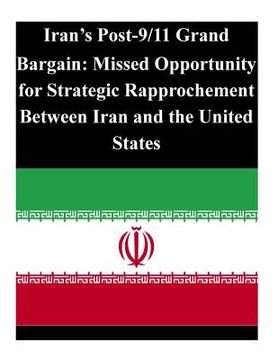Iran's Post-9/11 Grand Bargain: Missed Opportunity for Strategic Rapprochement Between Iran and the United States (en Inglés)
Reseña del libro "Iran's Post-9/11 Grand Bargain: Missed Opportunity for Strategic Rapprochement Between Iran and the United States (en Inglés)"
One of the most significant foreign policy dilemmas for the United States is the current stalemate with the Islamic Republic of Iran. The history of U.S.-Iran relations, since the 1953 CIA orchestrated coup of Mohammad Mossadeq, is one of mutual distrust and policy error. Although successive American presidents since 1979 have tried to improve relations, each effort failed because both sides refused to adjust the context through which they viewed the other. The events of 9/11, however, provided an unprecedented opportunity for a strategic rapprochement between the United States and Iran. After 9/11, Iran not only denounced the attacks and cooperated with the United States in Afghanistan, but also offered to negotiate a comprehensive resolution of differences with no preconditions. The events of 9/11 created the common ground and diplomatic dialogue necessary for rapprochement. Multilateral discussions expanded into bilateral cooperation in Afghanistan, and the Bush administration accomplished what no one since 1979 thought possible: direct negotiations with Iran on issues of mutual interest. But the administration was too impatient, and with American power and prestige at its height, began to rely on a one size fits all pre-emptive foreign policy prescribed by the new Bush Doctrine. The administration's neoconservatives, dominating the foreign policy process, viewed Iran through the same lens they viewed al Qaeda, the Taliban, and Saddam Hussein. After the bilateral channel became less productive in early 2003, Iran proposed a grand bargain to settle differences and resume diplomatic relations. But President Bush chose to end the bilateral dialogue, ignored the grand bargain proposal, and instead pursued a shortsighted policy of regime change in Iran. Ten years later, the implications of that decision continues to haunt the Obama administration, and the threat of a rogue, isolated, and nuclear-armed Iran is now a distinct possibility. One can only hope that pragmatists on both sides will adjust their lens, put aside differences, and find common ground.

